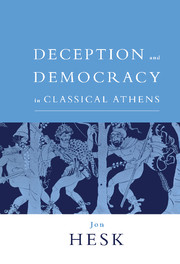Book contents
- Frontmatter
- Contents
- Preface
- Prologue
- 1 Deception and the rhetoric of Athenian identity
- 2 Deceiving the enemy: negotiation and anxiety
- 3 Athens and the ‘noble lie’
- 4 The rhetoric of anti-rhetoric: Athenian oratory
- 5 Thinking with the rhetoric of anti-rhetoric
- Epilogue
- Bibliography
- Index locorum
- General index
5 - Thinking with the rhetoric of anti-rhetoric
Published online by Cambridge University Press: 22 September 2009
- Frontmatter
- Contents
- Preface
- Prologue
- 1 Deception and the rhetoric of Athenian identity
- 2 Deceiving the enemy: negotiation and anxiety
- 3 Athens and the ‘noble lie’
- 4 The rhetoric of anti-rhetoric: Athenian oratory
- 5 Thinking with the rhetoric of anti-rhetoric
- Epilogue
- Bibliography
- Index locorum
- General index
Summary
Fuck all this lying look what I'm really trying to write about is writing not all this stuff.
The rhetorician would deceive his neighbours,
The sentimentalist himself; while art
Is but a vision of reality.
The study of how to uncover deceptions is also by and large the study of how to build up fabrications … one can learn how one's sense of ordinary reality is produced by examining something that is easier to become conscious of, namely, how reality is mimicked and/or how it is faked.
Primary Colors: metafiction and metarhetoric
One of the interesting features of modern literary fiction is its propensity for self-consciousness – critics call this ‘metafiction’. Such self-consciousness is hardly new: Homer's Odyssey contains many representations of song and story-telling which make it a self-reflexive epic. But the modern metafictional novel is often an explicit departure from the ‘classic realism’ of nineteenth-century fiction. Modern novelists like to make you aware that they are not representing reality or ‘truth’. Their metafiction sometimes comes close to the old tenets of so-called ‘Romantic Irony’: reality is beyond theirs or anybody's representation. They can also evoke the Shakespearean suggestion that ‘all the world's a stage’: social life involves the adoption and discarding of quasi-theatrical roles, the manipulation of one's self-representation according to context, the realisation that cherished realities are in fact illusions or illusions in fact.
- Type
- Chapter
- Information
- Deception and Democracy in Classical Athens , pp. 242 - 291Publisher: Cambridge University PressPrint publication year: 2000



